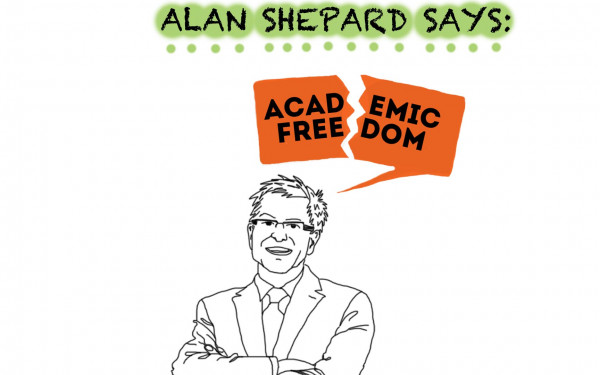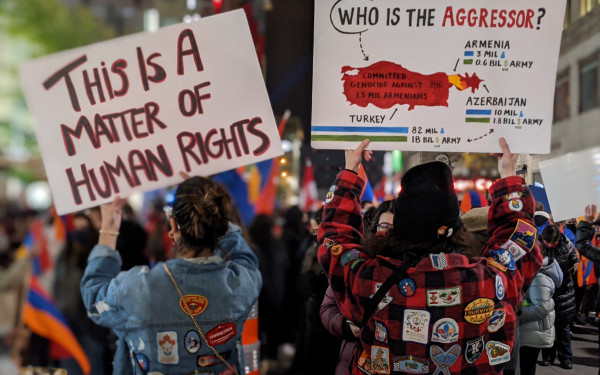I Am Othered by You and I Always Will Be
How Colonizer Governments Used Orientalism to Diminish the Media Impact of the Turkish Earthquakes
On Feb. 6, Turkey was struck by the world’s deadliest set of earthquakes in over a decade. With magnitudes of 7.8 and 7.6 and just nine hours apart, the destruction was comparable to the size of England.
On top of over 6,212 aftershocks experienced in and around Kahramanmaraş since, there was yet another separate earthquake of a 6.3 magnitude with the same epicenter on Feb. 20 and another of magnitude 5.6 a week later.
On Feb. 8, the death toll surpassed 9,000 as I was awaiting my bus. The clouds parted and the sun touched my face. I felt the sun’s warmth deep in my skin as tears uncontrollably ran down my face. I did not understand why this was happening right away. It was a mix of gratitude, shame, desperation and anger that made me cry: The gratitude that this sun could warm me; the desperation of knowing that the warmth of this sun could not reach under the rubble.
I got on the bus and cried the whole 40-minute ride. Ashamed that I was alive, ashamed that I was lucky. Desperate from knowing there was nothing in my individual power to do to save hundreds of thousands of my people who were longing for light. Angered because I knew this was not my fault. I knew whose fault it was and they remained unharmed. They always remained unharmed. I felt like I could very well lose my mind. As a Turk, I walked the streets with my chest tight; heart heavy, and I had to mourn and go about my day. No one around me had the slightest clue.
It was the middle of the night when the first tremor struck, which meant most people were sound asleep in their beds. Their leftovers saran-wrapped in the fridge. Children had already been tucked in and kissed goodnight. What does “sound asleep” or “home safe” mean if your home is where you are at the mercy of danger?
I was scouring the internet for the latest information, but couldn’t seem to get a straight answer. Hundreds were expected dead, then thousands, then tens of thousands. Twitter flooded with people tweeting their addresses out: “This is where I live. I am under the rubble here. Someone save me.” I knew this was going to be a massacre.
The failure to acknowledge the weight of the earthquakes on the part of my peers was not just incredibly isolating, but disturbing. These friends were a part of the life I had built here; my world was silently crumbling. I watched the tragedy of my people be omitted from my friends' social media when the year prior, they rallied and shared links over a building. I didn’t know where to go from here. Was my tragedy not ‘trendy’ enough to be worthy of an Instagram story? Perhaps the buildings that crumbled in Southeast Anatolia were not as easy on the eyes as the Notre Dame.
When Notre Dame in Paris was caught on fire, it took two days to accumulate donations of nearly $1 billion. Conversely, it took Canada four days to send search and rescue teams to Turkey, despite the death toll already nearing 35,000 at the time. Canada has pledged to donate $10 million to Turkey and Syria through the Red Cross, although we have yet to see any details or a confirmation pertaining to the aid. Not to mention the Red Cross was disfavoured by the Turkish community due to suspicions of the Red Cross mishandling the resources allocated to the quakes.
The activism I saw on social media and in person was extremely lacking when compared to reactions to crises that have happened in other parts of the world—specifically the West. The world is abundant in resources, and we surely have the power to alleviate countries like Turkey and Syria in moments of unexpected loss and devastating damage. The problem is they choose not to. Crises of any level in the West receive attention much faster and efficiently than crises in the East, even when quantifiably worse.
I became unable to laugh with my friends without feeling shame. I had to reevaluate my friendships because I had close friends who were not acknowledging what had happened. I had to reevaluate my place in the diaspora and who I was. I felt like I was betraying those who lost their lives to the earthquakes and disrespecting their memory by indulging in these friendships.
As I scrolled through socials, I came across a post that was a collection of notes and diary entries that were found in the rubble. One of them read: “Hi handsome, you’re becoming a father 😊” with a sonogram attached. I froze from despair. The image broke me. I was nudged out of this painful haze when my deskmate was tapping my shoulder repeatedly; I looked at him with confusion. He shook the paper aggressively and told me to take it. It was a Scantron sheet. My midterm was starting.
The blatant disregard I felt for our lives was echoed in the media response to the tragedy. Deeming tragedies in the Middle East as secondary to world news has a fundamental role in the alienation of people from the ‘periphery’ as opposed to the imagined ‘centre’ of the world. Why do Western governments and media get away with normalizing the negligence for Middle Eastern lives and relentlessly sustaining the notion that people from the Middle East are programmed to endure trauma? It’s rooted in the history of colonialism and imperialism, through which orientalism has been created to perpetuate harm against the Middle East .
Post-colonial governments perpetuate the narrative that the Middle East is an unsalvageable, poor, war-torn dystopia—not to mention the West’s inclination to see the entirety of the Middle East as a monolith when we are made up of complex identities and cultures.
Mediatic orientalism impedes the process of uncovering and addressing the root problems of what happened surrounding these earthquakes. The deaths of over 50,000 people is referred to as a mass murder by members of the Turkish community, and rightfully so. Fingers are pointed at Recep Tayyip Erdogan, the president of Turkey, for allowing the construction of buildings, residences and hotels that were not up to earthquake safety regulations despite being advertised as such. Earthquake safety checks were falsified at the expense of the lives of Turkish citizens and the profit of the Turkish government. Under Erdogan's rule, the government has indismissibly betrayed its people.This injustice is a violation and a threat to freedom—it should not serve the purpose of enabling ignorance within Western discourses.
The role Western powers play in the portrayal of Middle Eastern countries should also be considered. During his presidential term, Donald Trump did not hesitate to publicly threaten to “totally obliterate and destroy the Turkish economy,” exemplifying how power dynamics are established within the Western narrative. The media projects a one-dimensional view of the Middle East where its complexities are not addressed, further dehumanizing us. Western media outlets ensured the propagation of this view like when the New York Times tweeted an article regarding an explosion which took place in Istanbul in late 2022 and chose to exclusively highlight the amount of tourists which visited the area where the bombing took place. Presuming that the lives of Turkish civilians were disposable, and disillusioning the masses to adapt a learned division: an us and them, an othering that allows for the justification of their tyranny, ignorance, inaction and discriminatory resource and aid allocation.
Concordia was no different. They did not provide comprehensive or timely coverage on the matter, nor was there any relief provided to Turkish and Syrian students, except for a quick email sent out by the International Student Office. Having to reach out to professors one by one—or not reaching out at all and trying to keep it all together—and having to explain why we were not okay despite the survival of our immediate circle was simply excruciating. Surely, we were not new to having to put on a happy face, but repeated exposure to trauma does not make us immune to pain.
While we impatiently awaited empathy from our professors, sympathy from our peers, statements from our student union and university, we found comfort in each other. In the face of lacking institutional support and colonial indifference, the Turkish diaspora found strength in coming together.
This article originally appeared in Volume 43, Issue 13, published March 7, 2023.

_900_1240_90.jpeg)


_600_375_90_s_c1.jpg)

5_600_375_90_s_c1.jpg)
